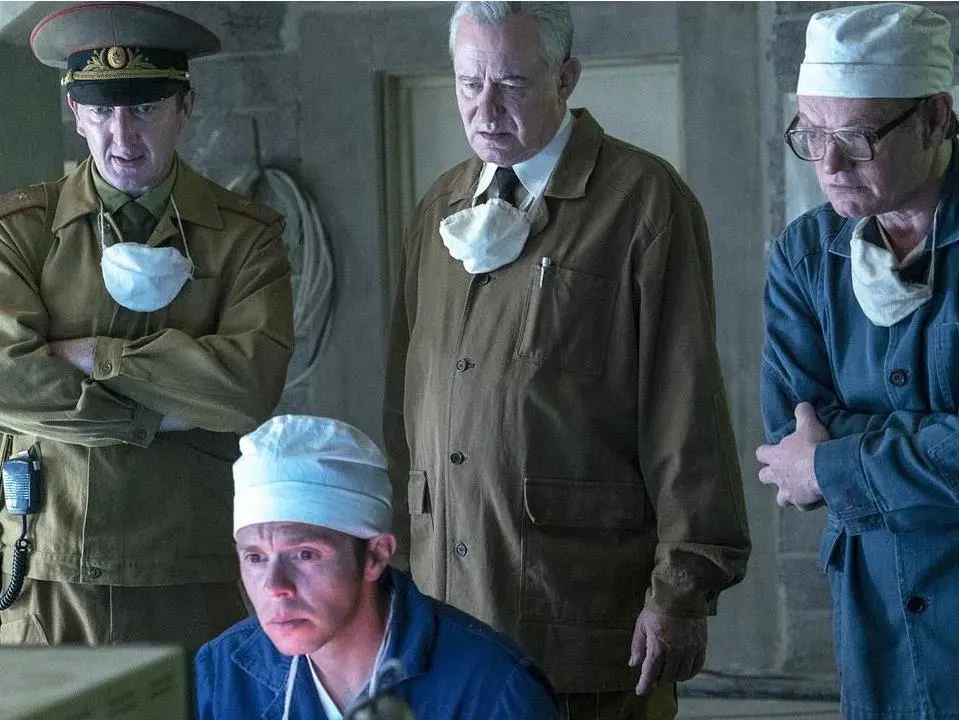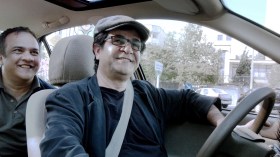Image: Chernobyl L-R: Nikolai Tarakanov (Ralph Ineson), commander of the Chernobyl Liquidators; Boris Shcherbina (Stellan Skarsgård); Valery Legasov (Jared Harris). Source: Foxtel.
The irony of Chernobyl is that while Craig Mazin’s five-part miniseries champions truth-telling, its dramatic power depends on fabrication. Chernobyl is a riveting showcase for sheer storytelling craft. It recreates the explosion of the number four reactor core at the Chernobyl Nuclear Power Plant on April 26, 1986, and the USSR’s response to it. The show’s attention to the details of its setting has impressed Soviet-born viewers; and its grim depiction of nuclear irradiation’s effects is viscerally horrifying in a way that’s rare in post-Cold War pop culture. (Threads, anyone?)
Director Johan Renck captures innumerable striking images: the dreamlike, socialist-realist spring colour of the pre-disaster city of Pripyat; the unearthly horror of birds dropping from the sky and deer rotting in the forest; the gaping wound of the destroyed reactor; and the uncanniness of empty, evacuated spaces patrolled by radiation-suited figures.
Chernobyl is intensely textural – and not just in the picturesque aesthetic of decay that fascinates urban explorers, for whom the Chernobyl Exclusion Zone remains a macabre tourist destination. Radioactive particles settle softly on hair and faces like deadly snowflakes. Human skin sloughs away obscenely, in contrast to prophylactic plastic and rubber. Coal miners toil in grimy nakedness to stabilise the slab beneath the reactor, like scenes from Mordor.
Even the sound design is extraordinary, from the insectile clicking of dosimeters to the eerie ambient score by Hildur Guðnadóttir, who constructed it using field recordings from inside the decommissioned Lithuanian power plant where the series was filmed.
An HBO/Sky co-production, Chernobyl is inescapably an Anglo-American story. It’s told in English, with a mainly British and Swedish cast, and it leans heavily on Western dramatic tropes such as the defiant truth-telling hero and the weaselly, bureaucratic villain. Like all period dramas, its concerns are really contemporary: it’s a polemic against today’s political isolationism (Brexit) and institutionalised untruth and contempt for expertise (the United States).
The series’ most ‘Western’ choice is to make an unambiguous hero of Valery Legasov (Jared Harris, from The Crown and Mad Men), an atomic scientist who was a key member of the cleanup commission. First seen two years after the disaster as a broken man, tape-recording his memoirs in his Moscow apartment, Legasov is instantly likeable because the hangdog Harris is so well known for – and so great at – playing good men struggling within toxic institutions.
Legasov’s foil is Boris Shcherbina (Stellan Skarsgård), the suave political apparatchik who’s tapped to supervise the disaster effort. While Harris portrays Legasov as an ingenuous boffin, so distressed by the blasé official attitudes he encounters that he speaks up in a Central Committee meeting in front of General Secretary Mikhail Gorbachev (David Dencik), Skarsgård’s Shcherbina is a pragmatic operator who understands how to grease the wheels of this system. One of the pleasures of Chernobyl is the professional rapport that grows between these two very different men as they learn to respect one another’s skills and judgment.
A third and much more problematic character is Ulana Khomyuk (Emily Watson), a nuclear physicist from Minsk who independently grasps the scope of the disaster and sets out to investigate it. Khomyuk is a fictional composite of the many scientists who aided the commission and uncovered vital insights into the causes of the disaster.
Khomyuk represents Chernobyl’s procedural impetus for transparency. She interviews the staff members most central to the ‘safety test’ that went catastrophically wrong: disagreeable supervisor Anatoly Dyatlov (Paul Ritter), on whom the state chiefly pins the blame; and the two staffers he brusquely overrules, shift boss Aleksandr Akimov (Sam Troughton) and young engineer Leonid Toptunov (Robert Emms). She also uncovers crucial flaws in the reactor itself, which effectively made it a ticking time bomb.
All this knowledge, acquired by just one person, enables Khomyuk in the final episode to offer a devastating blow-by-blow account of the disaster. Her insights are superheroic, and her morals absolute, in a way that’s satisfying to watch but not at all historically plausible. On the one hand, Chernobyl wants us to believe that sinister KGB agents trail our heroes everywhere, and that the state constantly threatens them with summary execution. But on the other, Chernobyl allows both Khomyuk and Legasov to push back publicly in ways a good Soviet would never dare.
The character of Khomyuk is also a homage to the Nobel laureate Svetlana Alexievich, on whose oral history Voices from Chernobyl this miniseries was substantially based. It’s from Alexievich that this series gets the heartbreaking story of Lyudmilla Ignatenko (Jessie Buckley), the pregnant wife of first-responder fireman Vasily Ignatenko (Adam Nagaitis). Lyudmilla stays with her dying husband until the end, and pays a terrible price.
Another plotline follows young Pavel Gremov (Barry Keoghan), one of thousands of civilians drafted to the cleanup effort as ‘liquidators’. It’s Pavel’s gruesome job to accompany seasoned Georgian soldier Bacho (Fares Fares) in shooting radioactive domestic pets left behind by residents evacuated from the exclusion zone.
This human scale makes Chernobyl both moving and emotionally harrowing, emphasising the heroic stoicism of those who fought to contain the disaster in full knowledge of the risks. The value of this miniseries is that its lucid, vivid storytelling – however confected – does illuminate the systemic causes and human toll of this disaster, which were previously known only vaguely, as a sort of cautionary fairytale. The USSR hid the scope of the catastrophe both from its own people and from the international community; and this secrecy has meant the story is still known only partially and equivocally.
Chernobyl draws attention to cronyism, doublethink and straight-up gaslighting. Characters who understand what’s actually happening are dismissed and ridiculed because it should not, indeed cannot be happening, and allegiance to systems takes precedence over people’s safety.
Poor Anatoly Sitnikov (Jamie Sives) is ordered to inspect the reactor because the plant manager Viktor Bryukhanov (Con O’Neill) and chief engineer Nikolai Fomin (Adrian Rawlins) refuse to believe the core has exploded. Sitnikov obeys, even though he knows this will kill him. A doctor (Nadia Clifford) who sees the reactor on fire asks a hospital colleague if they have iodine tablets, only to be told, “Why would we need those?” And a local Party bureaucrat (Donald Sumpter) calmly advises cutting the phone lines to stop word getting out: “That is how we keep the people from undermining the fruits of their own labour.”
The trouble with complete historical fidelity is that it doesn’t make great TV. History’s contested, multi-voiced nature and insistence on granular accuracy can be… well, boring. Chernobyl is great TV – some of this year’s best. It’s a landmark account of this tragedy; but it shouldn’t be regarded as definitive. After all, its desire to entertain is an ideology as tendentious and self-effacing as late communism.
| 4.5 stars |
★★★★☆
|
Chernobyl is available to stream in Australia on Fox Showcase
Actors:
Director:
Format:
Country:
Release:





